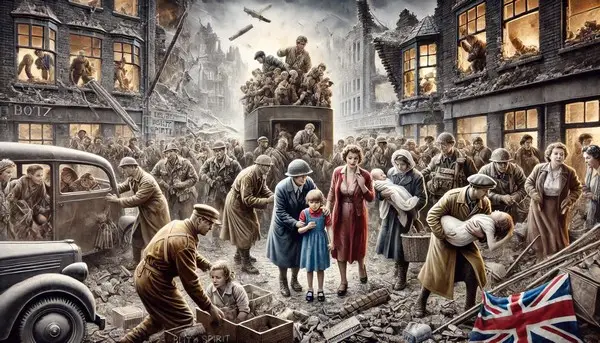Table of Contents
- Historical Context of the Blitz Spirit
- The Blitz Spirit as a Social Construct
- The Role of Media in Propagating the Blitz Spirit
- Political Utilization of the Blitz Spirit
- Sociological Perspectives on the Blitz Spirit
- Case Studies: Invocations of the Blitz Spirit in Contemporary Crises
- The Implications of Invoking the Blitz Spirit
- Conclusion
The term “Blitz spirit” originates from the resilience displayed by British civilians during the German bombing campaign known as the Blitz in World War II. This period, from September 1940 to May 1941, saw extensive bombing of London and other major cities. Despite the destruction and loss of life, the British population’s fortitude and communal solidarity became legendary. Over time, the “Blitz spirit” has come to symbolize a collective stoicism and unity in the face of adversity. However, in contemporary discourse, this concept is often invoked by political and social elites to rally public morale during crises. This paper explores how the Blitz spirit is utilized to distract from systemic failures, examining its implications within a sociological framework.
Historical Context of the Blitz Spirit
The Blitz was a significant period in British history, characterized by widespread devastation and hardship. The relentless bombing campaigns targeted both military and civilian infrastructure, resulting in extensive casualties and destruction of property. The government’s response to the Blitz included measures to maintain morale, such as the dissemination of propaganda that emphasized resilience and national unity. The Blitz spirit emerged as a narrative highlighting the British people’s ability to endure and persevere under extreme conditions.
During the Blitz, various forms of propaganda were employed to reinforce this spirit. Posters, radio broadcasts, and newsreels depicted ordinary citizens carrying on with their daily lives, despite the dangers and challenges they faced. This narrative served to bolster public morale and foster a sense of collective identity and purpose. The portrayal of the Blitz spirit was instrumental in sustaining civilian morale and ensuring social cohesion during a time of national crisis.
The Blitz Spirit as a Social Construct
The Blitz spirit is not merely a historical phenomenon but a socially constructed narrative. It embodies certain cultural values, such as stoicism, bravery, and community solidarity, which are idealized and romanticized. As a social construct, the Blitz spirit is invoked to promote social cohesion and resilience during contemporary crises, whether they be economic downturns, natural disasters, or public health emergencies.
This constructed narrative serves several functions. Firstly, it provides a sense of continuity and connection to a perceived golden age of national unity and collective effort. Secondly, it serves as a normative ideal, encouraging individuals to exhibit similar behaviors and attitudes in the face of contemporary challenges. Lastly, it offers a sense of hope and optimism, suggesting that just as previous generations overcame adversity, so too can current populations.
The Role of Media in Propagating the Blitz Spirit
Get the full article AD FREE. Join now for full access to all premium articles.
View Plans & Subscribe Already a member? Log in.





